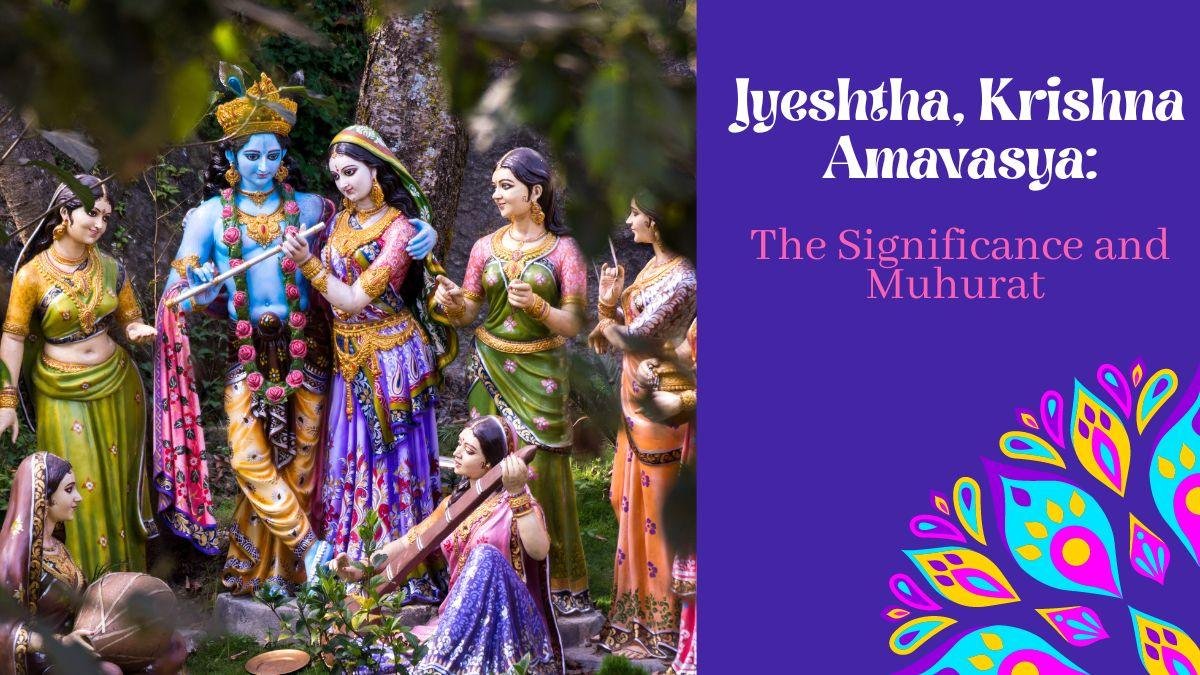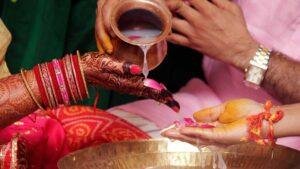Jyeshtha, Krishna Amavasya, a significant day in the Hindu lunar calendar, holds immense spiritual importance. It intertwines mythological tales, religious rituals, and spiritual practices. This article explores the significance of Jyeshtha, Krishna Amavasya, the regional variations in its celebration, and the rituals associated with it. Join us as we delve into this sacred occasion, inviting devotees to embrace introspection, divine connection, and ancestral worship.
Significance of Jyeshtha, Krishna Amavasya

Jyeshtha month holds great mythological and religious significance in Hinduism. It is believed to be the month dedicated to Lord Shiva, the deity associated with destruction and transformation. According to Hindu mythology, during the Jyeshtha month, Lord Shiva consumed poison (halahala) that emerged from the churning of the cosmic ocean (Samudra Manthan) to save the universe from its destructive effects. This event is known as the “Samudra Manthan” or “Churning of the Ocean” and symbolizes the triumph of good over evil.
Additionally, Jyeshtha month is associated with the Nakshatra (lunar mansion) called Jyeshtha, which is ruled by Lord Indra, the king of gods. Lord Indra is regarded as the god of thunder and rain, and his blessings are sought for prosperity and abundance. Thus, the Jyeshtha month is considered auspicious for seeking divine blessings and performing spiritual practices.
Krishna Amavasya, which falls during the Jyeshtha month, holds special spiritual significance. Amavasya refers to the New Moon day when the moon is not visible. It is considered a time of spiritual potency and an opportunity for self-reflection and renewal.
Observing Krishna Amavasya is believed to bestow several benefits:
Ancestral worship: It is considered an auspicious time to honour and seek blessings from ancestors. Performing rituals and offering prayers to departed souls can bring peace and harmony to one’s lineage and help alleviate ancestral karma.
Spiritual purification: Krishna Amavasya is regarded as a powerful time to cleanse oneself of negativity and impurities. Through prayers, meditation, and introspection, individuals can purify their mind, body, and soul, paving the way for personal growth and spiritual progress.
Manifestation of desires: It is believed that the energies during Krishna Amavasya are conducive to manifesting one’s desires. By focusing on positive intentions, practising affirmations, and performing spiritual practices, individuals can enhance their ability to attract and manifest their goals and aspirations.
Seeking divine blessings: Devotees can seek the blessings of deities, particularly Lord Shiva and Lord Indra, during Krishna Amavasya. By offering prayers, performing rituals, and expressing devotion, individuals can strengthen their connection with the divine and receive divine grace and blessing.
The Puja Vidhi of Jyeshtha, Krishna Amavasya

- Cleanse yourself: Take a purifying bath and wear clean and fresh clothes.
- Choose a sacred space: Select a clean and peaceful area in your home or a place of worship to perform the puja.
- Gather puja items: Collect the necessary puja items, including a picture or idol of Lord Shiva or Lord Indra, incense sticks, flowers, fruits, sweets, camphor, sacred water (Ganga jal), sacred thread (moli), and a puja plate.
Arrangement of the puja items and setup
- Place the idol or picture of Lord Shiva or Lord Indra on a clean cloth on the puja altar or platform.
- Arrange the puja items neatly in front of the deity.
- Light the incense sticks and keep them burning throughout the puja.
Invocation of deities and offering prayers
- Begin by invoking the presence of the deities through a prayer, expressing reverence and inviting their blessings.
- Chant mantras or prayers dedicated to Lord Shiva or Lord Indra, such as the Maha Mrityunjaya Mantra or the Indra Gayatri Mantra.
- Offer flowers, fruits, and sweets as a form of bhog (offering) to the deities.
- Light the camphor and perform an aarti (circumambulation of the deity with the lit camphor), accompanied by devotional songs or chants.
Performance of specific rituals and observances
- Offer sacred water (Ganga jal) to the deity for purification.
- Tie the sacred thread (moli) on your wrist as a symbol of protection and divine connection.
- Perform abhishekam (ritual bath) of the deity using milk, honey, curd, ghee, and water, while chanting respective mantras.
- Recite prayers or stotras dedicated to Lord Shiva or Lord Indra, expressing gratitude and seeking their blessings.
- If performing ancestral worship, light a separate diya (lamp) for the departed souls and offer prayers for their well-being and peace.
Importance of Meditation and Chanting During the Puja
- After the rituals and offerings, sit in a comfortable posture and engage in meditation.
- Focus your mind on the divine energies of Lord Shiva or Lord Indra, and contemplate their virtues and significance.
- Chant mantras or recite sacred texts associated with the deities, such as the Rudram or the Shiva Panchakshara Stotram.
- The combination of meditation and chanting helps to deepen your spiritual connection, purify your mind, and invoke divine blessings.
Fasting on Krishna Amavasya and its significance
- Observing a fast on Krishna Amavasya is considered auspicious and spiritually beneficial.
- Fasting is believed to purify the body, mind, and soul, and it is a way to express devotion and discipline.
- The fast can be observed as a complete fast, consuming only water, or as a partial fast, where one consumes fruits, milk, and light vegetarian food.
- Fasting is believed to enhance concentration during prayers and meditation and strengthen one’s spiritual connection.
Charity and acts of kindness associated with this day
- Krishna Amavasya is considered an opportune time for acts of charity and compassion.
- Donate food, clothes, or other essentials to the needy or contribute to charitable organizations.
- Offer help or support to those in need, such as visiting orphanages, elderly homes, or hospitals.
- Acts of kindness and selfless service are believed to generate positive karma and bring blessings.
Visiting sacred places and taking holy dips in rivers
- Many devotees choose to visit sacred places, temples, or pilgrimage sites associated with Lord Shiva or Lord Indra during Krishna Amavasya.
- Taking a holy dip in rivers or sacred water bodies, especially at places like Varanasi, Haridwar, or Rishikesh, is considered purifying and spiritually significant.
- The practice of bathing in sacred rivers is believed to cleanse sins, bring blessings, and facilitate spiritual growth.
Observing specific rituals for ancestral worship
- Krishna Amavasya is a propitious time for honoring and seeking blessings from ancestors.
- Perform rituals such as Tarpana, where water is offered to ancestors while reciting their names and seeking their guidance and blessings.
- Light a lamp or candle for the departed souls and offer prayers for their peace and liberation.
- This practice is believed to alleviate ancestral karma, bring ancestral blessings, and foster harmony in the lineage.
By incorporating these additional practices and customs into the observance of Krishna Amavasya, individuals can deepen their spiritual experience, foster compassion, and strengthen their connections with both the divine and their ancestral roots.
Regional variations in the celebration and observance of this day
North India: In North India, especially in states like Uttar Pradesh and Bihar, Jyeshtha, Krishna Amavasya is associated with the festival of Vat Purnima or Vat Savitri Vrat. Married women observe a day-long fast and tie sacred threads around banyan trees, seeking longevity and well-being for their husbands.
Maharashtra: In Maharashtra, Krishna Amavasya is observed as Shani Amavasya. Devotees visit Shani temples and perform rituals to appease Lord Shani (Saturn) and seek his blessings for protection and removal of obstacles.
West Bengal: In West Bengal, this day is known as “Aamabashya” and is dedicated to Goddess Kali. Devotees visit Kali temples, offer prayers, and perform special rituals to seek her blessings and protection.
Gujarat: In Gujarat, Jyeshtha, Krishna Amavasya is celebrated as Agyaras or Agyaras Beej. It is dedicated to Lord Shiva, and devotees observe a fast and perform special prayers to seek his blessings and protection.
Notable festivals or events associated with Jyeshtha, Krishna Amavasya
Ganga Dussehra: In some parts of India, Jyeshtha, Krishna Amavasya marks the beginning of the ten-day festival of Ganga Dussehra. Devotees gather on the banks of the holy river Ganges to take dips in its sacred waters and offer prayers to Goddess Ganga.
Vat Purnima: As mentioned earlier, Vat Purnima is celebrated on Jyeshtha, Krishna Amavasya in North India. It is a festival dedicated to the well-being and longevity of husbands, and married women observe fasting and perform rituals around banyan trees.
Shani Amavasya: Shani Amavasya is observed on Jyeshtha, Krishna Amavasya in Maharashtra. Devotees offer prayers to Lord Shani and seek his blessings for protection and the removal of obstacles.
Agyaras or Agyaras Beej: In Gujarat, Agyaras are celebrated on Jyeshtha, Krishna Amavasya. Devotees fast and worship Lord Shiva, seeking his blessings and protection.
These festivals and events associated with Jyeshtha, Krishna Amavasya reflect the rich cultural and regional diversity of India, showcasing various customs, rituals, and traditions followed in different parts of the country to honor this auspicious day.
Spiritual renewal: Krishna Amavasya offers an opportunity for self-reflection, introspection, and spiritual renewal. It is a time to let go of past negativities, release attachments, and embark on a fresh spiritual journey.
Muhurat of Jyeshtha, Krishna Amavasya
Muhurat and Astrological Details for Jyeshtha, Krishna Amavasya:
- Date:19/5/23
- Sunrise: 05:33 AM
- Sunset: 06:59 PM
- Moonrise: No Moonrise
- Moonset: 06:55 PM
- Shaka Samvat: 1945 Shobhakrit
- Vikram Samvat: 2080 Nala
- Gujarati Samvat: 2079 Aananda
- Amanta Month: Vaishakha
- Purnimanta Month: Jyeshtha
- Weekday: Shukrawara (Friday)
- Paksha: Krishna Paksha
- Tithi: Amavasya until 07:52 PM
- Nakshatra: Bharani until 05:59 AM
*It is important to note that the above information is based on UAE timing*
Conclusion
In conclusion, Jyeshtha, Krishna Amavasya offers a sacred opportunity for worship, reflection, and spiritual growth. Its mythological associations, regional variations, and diverse customs enrich the observance of this auspicious day. By engaging in rituals, fasting, acts of charity, and ancestral worship, individuals can deepen their spiritual connection and receive divine blessings. Jyeshtha, Krishna Amavasya beckons devotees to embark on a transformative journey of self-discovery and divine communion. Embrace the wisdom and grace of this sacred occasion, and may it inspire you to embrace a path of spiritual renewal and inner transformation.



















Add comment